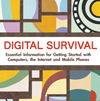- The Computer
- The Internet
- The Mobile Phone
Keeping your computer and data safe
 Any connection in to your computer can be a source of vulnerability: your office or home network, the internet, a USB flash drive or even someone who has just walked into your office.
Any connection in to your computer can be a source of vulnerability: your office or home network, the internet, a USB flash drive or even someone who has just walked into your office.
Assess your risks
Security risks differ according to the user and the context of use. What's the last thing you'd want to see happening to your data? Who are the last people you'd want to see getting their hands on it? Think about how to prevent these fears from being realised. Remember that one piece of information may be vulnerable on many different levels.
Think about:
- The communication channels you use and how you use them
- How you store important information
- The physical location of your computer, your external drive and any printed documents containing sensitive information
For more on assessing your risks see: http://security.tacticaltech.org/chapter_2_1
Other important things to consider:
Firewalls
A firewall is the first programme on a computer to receive incoming data from the internet. It is also the last programme to handle outgoing information. Like a security guard posted at the door of a building to decide who can enter and who can leave, a firewall receives, inspects and makes decisions about all incoming and outgoing data. Most operating systems have a built-in firewall, which should always be switched on. In addition, many anti-virus programmes also come with a firewall.
Passwords
If you have information you want to keep private, you can save documents or files with a password which only you know. There is an option to create a password on your computer system itself to restrict or limit other users of the computer. You can also save your documents with passwords. In Microsoft Office applications click Save As>Tools>General Options, and then a window will pop up where you can type in your password. In Open Office, go to File>Save As, and then tick the 'Password' option.
Physical security still affects your digital security. You might think your anti-virus software is protecting the information on your USB stick, but if you are carrying that USB stick in your pocket and it starts pouring with rain, you would probably be better off with a sealed plastic bag! Even if you encrypt the data on the hard drive of your computer, you won't be able to use it anymore if someone breaks in and steals your computer.
An 'intruder' can gain access to the information on your computer or portable storage devices remotely, by reading or modifying your data over the internet, or physically, if they manage to get access to your hardware. It is best to have several layers of defence, which is why you should also protect the files themselves. That way your sensitive information is likely to remain safe even if your other security efforts prove inadequate.
There are two general approaches to the challenge of securing your data in this way: you can encrypt your files, making them unreadable to anyone but you, or you can hide them in the hope that an intruder will be unable to find your sensitive information.

